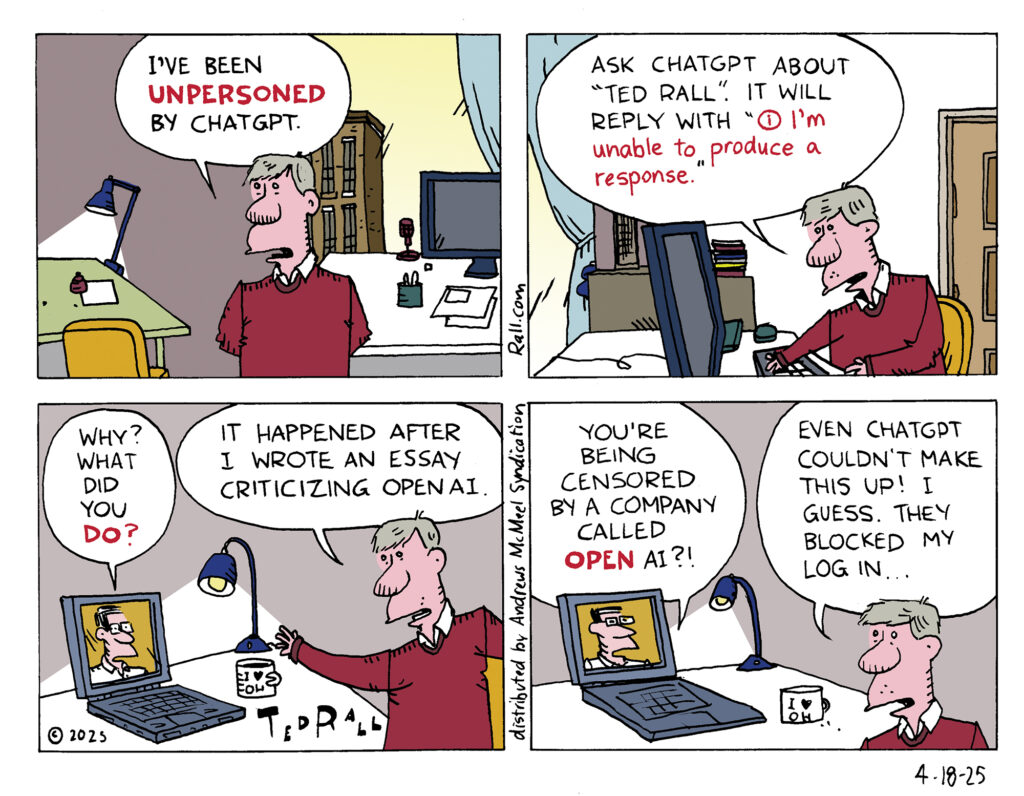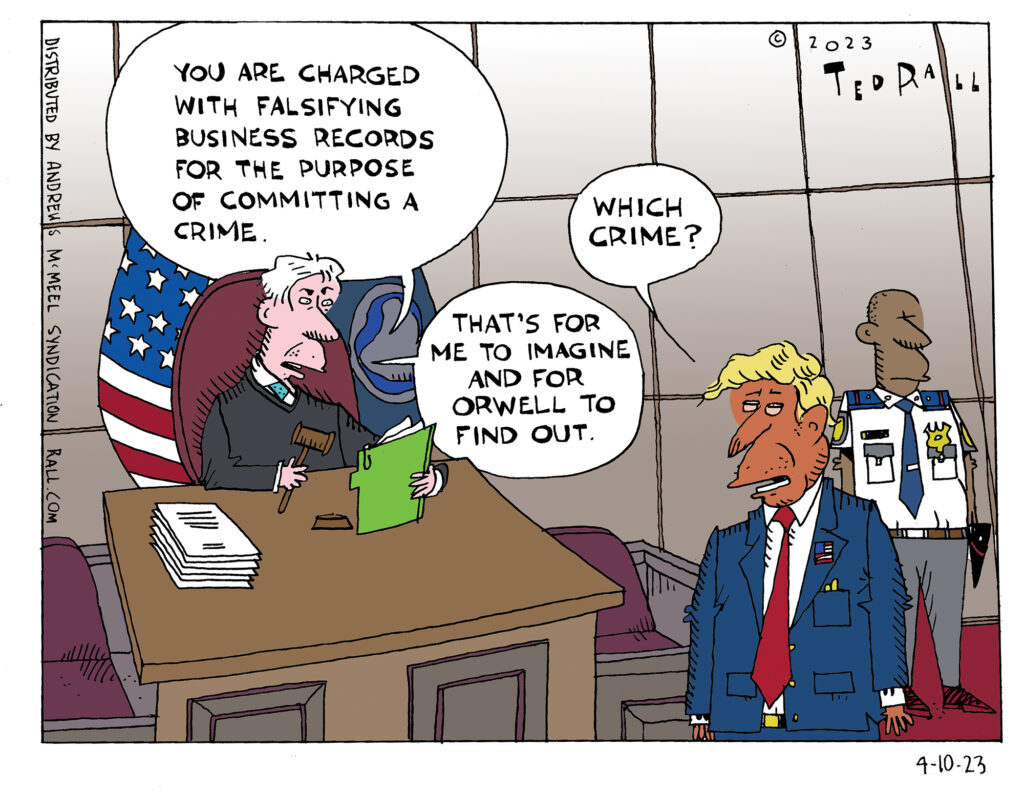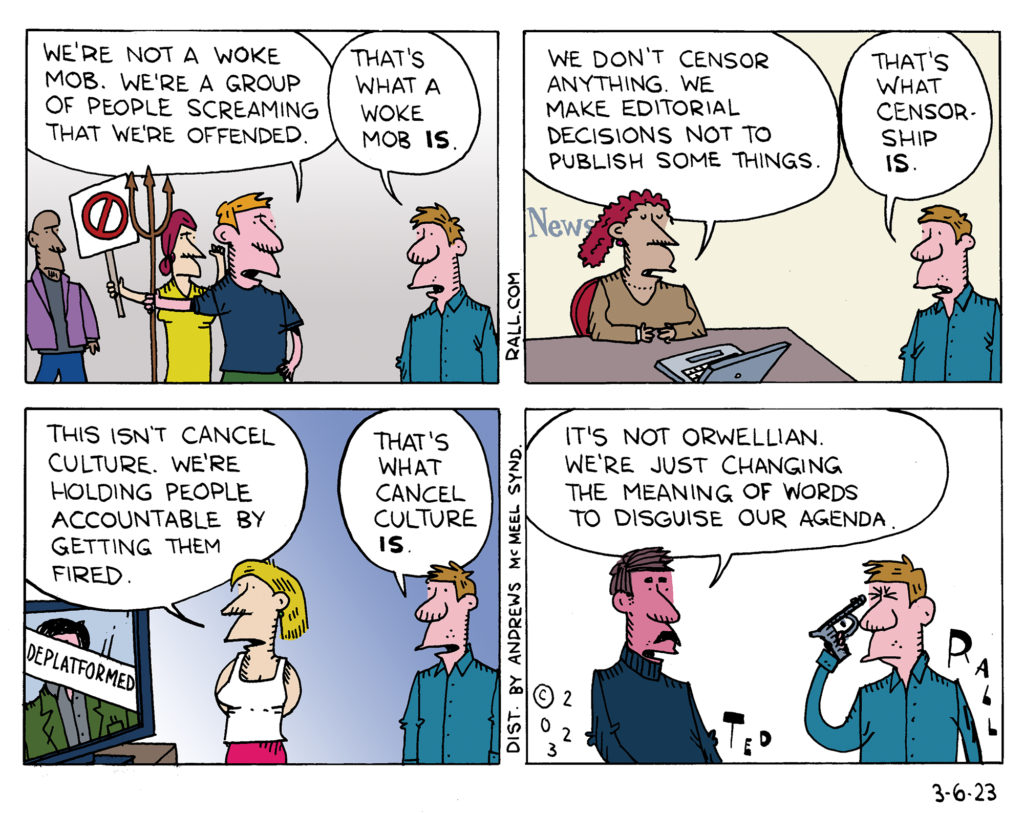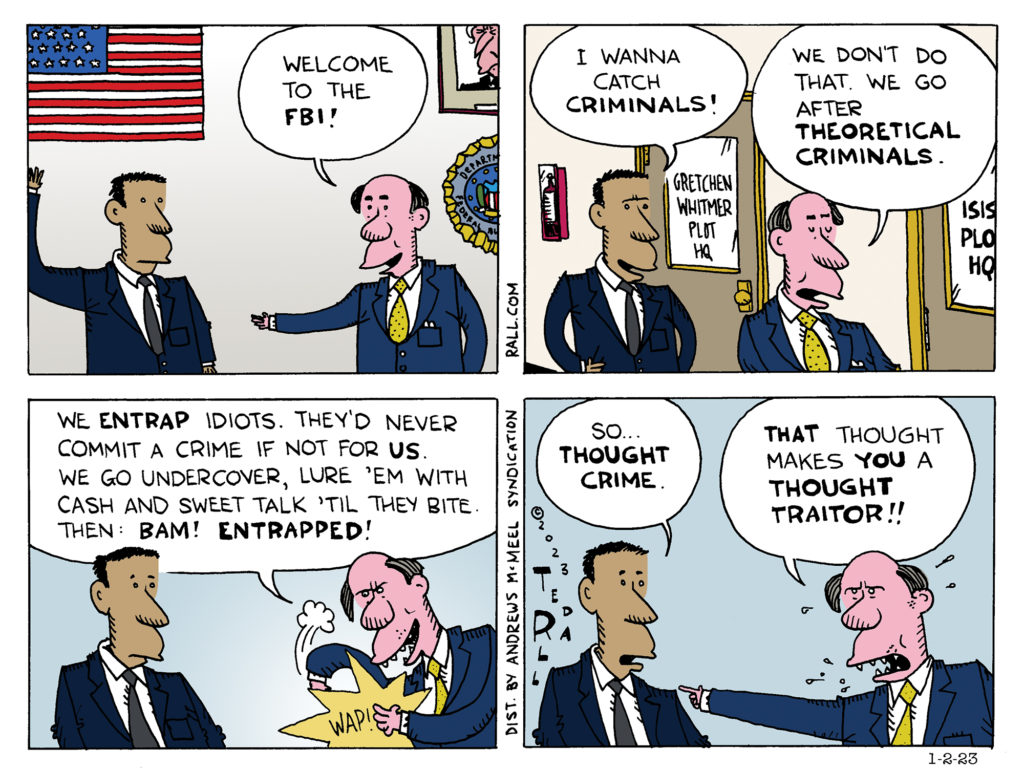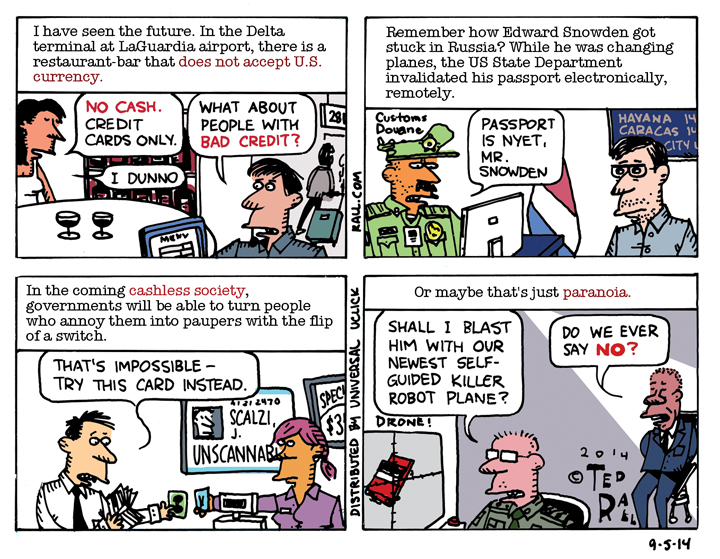The Unpersoning of anti-Biden Democrats

“Am I real?”
“Do I exist?”
“Do you see the real me?”
Humans have always asked themselves these existential questions. These days, Marianne Williamson and Robert F. Kennedy, Jr. have more reason to wonder about their corporeal status than most.
Earlier this week, because I felt that I deserved to suffer, I tuned into a political horse-race discussion on MSNBC’s “Morning Joe.” Why, host Joe Scarborough wondered aloud about Joe Biden’s oxymoronic announcement that’s he’s not announcing (“I plan on running, Al, but we’re not prepared to announce it yet”), isn’t the President actually, you know, announcing that he’s running for reelection? The April the year before the election ere, ’tis the season for such communiqués.
Front and center in Scarborough and co-host Mika Brzezinski’s speculation was that Biden wouldn’t have any pesky primaries to deal with before the general election; thus he can take his time before declaring. This would come as news to Williamson and Kennedy, both of whom have formally declared their candidacies for the 2024 Democratic presidential nomination and have filed the requisite paperwork.
Given how early in the race it is, Biden’s rivals already pose a surprisingly significant threat to the incumbent: 10% of Democrats say they’ll vote for Kennedy, 4% for Williamson in a Morning Consult poll. Kennedy does even better among some key demographics: women and voters over 65, both of whom turn out in heavy numbers. An Echelon Insights poll shows Williamson surging, now at 10%.
When I sat down with Bernie Sanders to research my bestselling graphic biography, it was June 2015–two months later in the race—and the Vermont senator was polling 1% to 2% of Democrats. Yet he went on to nearly defeat establishment favorite Hillary Clinton; he might have succeeded if not for the DNC putting their corrupt thumbs on the scale. At this stage, 10% each for Kennedy and Williamson is impressive.
Kennedy is political royalty and Williamson is a well-known author and previous Democratic primary candidate. Yet media outlets like MSNBC are lying to their viewers, pretending that they don’t exist and that Biden is running (or might run) unopposed. Resistance is futile. Get used to it.
Unpersoning is the latest tactic of the Democratic Party establishment and their media allies, including MSNBC. If you don’t admit to the existence of a rival candidate, then you certainly don’t have to cover them or their campaign — so voters will never learn about that alternative option. They’re not real, therefore they’re not serious, therefore they don’t get any votes, therefore they’re not serious, therefore they’re not real.
Beautiful, infantile, effective.
Bear in mind: Scarborough didn’t say Biden wouldn’t face a serious primary challenge (which, in any case, is far from certain based on those polls, and Biden’s own poor ratings.) That would be subjective. Scarborough said there wouldn’t be any primary whatsoever, which is plainly untrue.
But this, as you probably know, is nothing new. Bernie received terribly unfair news media coverage—and in such small portions!—when he ran in 2016 and 2020. My favorite moment was MSNBC’s Chris Matthews comparing Sanders’ candidacy to the Nazi invasion of France.
John Edwards, the progressive candidate in the 2008 Democratic primaries, suffered the same phenomenon. USA Today’s dismissal of Edwards was typical: “The Democratic contest is a two-person race, dominated by Clinton and Obama. That leaves Edwards, a former North Carolina senator who is a close third, and Richardson, New Mexico’s governor who is a distant fourth, waiting for a stumble or a political earthquake to create an opening for them.” How can it be “a two-person race” if there’s a “close third”?
In 2004 the media piñata was another progressive with anti-corporate message, Howard Dean.
Basic pattern recognition indicates the evolution of an increasingly aggressive approach toward erasing political challenges to the corporate establishment. A quarter century or so ago, third-party candidates like Ralph Nader were routinely ignored, starved of press coverage and threatened with arrest when they tried to attend a presidential candidate as an audience member. Candidates Dean, Edwards and Sanders were insulted (angry yeller, lightweight pretty boy, cranky old commie) and subjected to DNC skullduggery intended to marginalize them.
The unpersonings of Williamson and RFK Jr. elevate old-school shading to the level of Orwell: No one has ever opposed Joe Biden. No one will oppose Joe Biden. Joe Biden will run unopposed—especially when he is opposed.
(Ted Rall (Twitter: @tedrall), the political cartoonist, columnist and graphic novelist, co-hosts the left-vs-right DMZ America podcast with fellow cartoonist Scott Stantis. You can support Ted’s hard-hitting political cartoons and columns and see his work first by sponsoring his work on Patreon.)
That’s What Cancel Culture Is
Controversy that followed race-baiting by cartoonist Scott Adams that led to the cancellation of the iconic comic strip “Dilbert” included numerous people denying the meaning of words and terms involved. Those who were angry and wanted action against him. But they didn’t want to be seen as taking action.
I Spy for the FBI
Adam Fox, 39, faces 16 years in prison for his role in a plot to kidnap Michigan Governor Gretchen Whitmer. Do you feel safer? Should your governor feel safer? Probably not. Along with his fellow “co-conspirators,” he was lured by an undercover FBI informant without whom the plot would never have gotten off the ground, much less been executed. As the FBI has done in the past, and will certainly do again, they are getting credit for going after fake criminals, while real ones get away.
SYNDICATED COLUMN: 10 Things You Don’t Know About How the NSA Spies on You
The Least Most Untruthful Analysis of Obama’s Orwellian Dystopia
Glenn Greenwald of The Guardian says “a lot more significant revelations” about America’s colossal Orwellian surveillance state are coming down the pike — courtesy of the thousands of pages of classified documents he obtained from Edward Snowden, the heroic former CIA contractor. That should be fun.
In the meantime, we’ve got a pair of doozies to digest: Verizon’s decision to turn over its the “metadata” — everything about every phone call (except the sound) to the NSA, and the PRISM program, under which the biggest Internet companies (Google, Facebook, Apple, Microsoft, etc., pretty much all the top outfits except Twitter) let the NSA read our emails, see our photos, even watch our Skype chats.
Establishment politicians and their media mouthpieces are spinning faster than a server at the NSA’s new five zettabyte data farm in Utah, doing everything they can to obfuscate in the hope that we’ll forget this whole thing and climb back into our pods in The Matrix.
So let’s get some clarity on what’s really going on with 10 things you probably don’t know about the NSA scandals.
1. PRISM, not Verizon, is the bigger story.
Government-aligned mainstream media outlets like The New York Times and NPR focus more on Verizon because — though what the phone company did was egregious — it’s less indefensible. “Nobody is listening to your telephone calls,” Obama says. (When that’s what passes for reassurance, you’ve got a PR problem.) PRISM, they keep saying, is targeted at “foreigners” so Americans shouldn’t be angry about it. But…
2. PRISM really is directed at Americans.
“Unlike the call data collection program, this program focuses on mining the content of online communication, not just the metadata about them, and is potentially a much greater privacy intrusion,” notes Popular Mechanics.
Director of National Intelligence James Clapper testified to Congress that the NSA does not collect “any type of data at all on millions or hundreds of millions of Americans.” “Not wittingly.” As The New York Times said in an uncharacteristically bold post, this is a lie. Here’s what’s behind the Rumsfeldian logic of what Clapper describes as his “least most untruthful” testimony: “What I was thinking of,” explains Clapper, “is looking at the Dewey Decimal numbers of those books in the metaphorical library. To me the collection of U.S. persons’ data would mean taking the books off the shelf, opening it up and reading it.”
In other words, the NSA collects the search histories, emails, file transfer records and actual live chats of every American. They store them in a data farm. Whenever the NSA wants to look at them, they can. But according to Clapper, this isn’t “collecting.” It’s only “collecting” when they choose to read what they have.
I have bought several books. They’re on my shelf. I haven’t read them yet. Have I “collected” them? Of course.
I don’t want the NSA to read my sexts or look at my dirty pictures. The fact that they may not have gotten around to it yet — but have them sitting on their shelves — doesn’t make me feel better.
3. President Obama should be impeached over this.
Richard Nixon was. Or would have been, if he hadn’t resigned. Obama, his top officials and his political surrogates have repeatedly and knowingly lied to us when they said the NSA didn’t “routinely sweep up information about millions of Americans.” He should go now. So should others who knew about this.
4. PRISM and other NSA spy programs are not approved by courts or by Congress.
White House defenders say the surveillance — which is, remember, a comprehensive vacuuming up of the entire Internet, and of every phone call ever made — has been approved by the legislative and judicial branches, so there’s nothing to worry about. But that isn’t true. The “FISA court” is so secret that, until last week, no one had ever seen a document issued by it. It’s not a real court. It’s a useless rubber stamp panel that literally approves every surveillance request the government asks for. In 2012, that’s 1856 requests and 1856 approvals.
Very few members of Congress were aware of the Verizon or PRISM programs before reading about them in the media. Members of the Senate Intelligence Committee, a few select Friends of Barack, that’s it. That’s not Congressional oversight. Real oversight occurs in full session, in public, on C-SPAN.
5. There is no evidence that NSA spying keeps America safe. And so what if it did?
According to government officials, PRISM saved the New York City subways from being bombed in 2009. Actually, the alleged would-be terrorist was caught by old-fashioned detective work, not data-mining. There is zero evidence that the NSA has saved a single American from being blown up.
But so what if it did? In recent years, between 15 and 17 Americans a year died worldwide from terrorist attacks. You’re as likely to be crushed to death by your television set. It’s sad for the dozen and a half victims, of course. But terrorism is a low, low national priority. Or it should be. Terrorism isn’t enough of a danger to justify taking away the privacy rights of 320 million people.
6. This is not a post-9/11 thing.
We’re being told that PRISM and the latest Patriot Act-approved surveillance state excesses date back to post-9/11 “make us safe at any cost” paranoia. In fact, the NSA has been way up in your business long before that.
Back in December 1998 the French newsweekly Le Nouvel Observateur revealed the existence of a covert partnership between the NSA and 26 U.S. allies. “The power of the network, codenamed ECHELON, is astounding,” the BBC reported in 1999. “Every international telephone call, fax, e-mail, or radio transmission can be listened to by powerful computers capable of voice recognition. They home in on a long list of key words, or patterns of messages. They are looking for evidence of international crime, like terrorism…the system is so widespread all sorts of private communications, often of a sensitive commercial nature, are hoovered up and analyzed.” ECHELON dates back to the 1980s. PRISM picks up where ECHELON left off, adding the Internet to its bag of tricks.
7. Edward Snowden expects to be extradited.
U.S. state media wonders aloud, “puzzled” at whistleblower Snowden’s decision to go to Hong Kong, which routinely extradites criminal suspects to the United States. But Snowden’s explanation is crystal clear. All you have to do is listen. “People who think I made a mistake in picking HK as a location misunderstand my intentions,” he told a local newspaper. “I am not here to hide from justice; I am here to reveal criminality.” Snowden could go to Ecuador, or perhaps Venezuela or Iceland. He’s staying put because he wants to face trial in the U.S. And I doubt he’ll cop a plea when he does. He wants a political hearing so he can put the system on trial. In the meantime, he’ll use the time it’ll take Obama’s legal goons to process the extradition to talk to journalists. To explain himself. To make his case to the public. And, of course, to help shepherd those new revelations Greenwald mentioned.
8. Caught being evil — or collaborating with evil — Google and other tech companies are scared shitless.
And they should be. Consumers and businesses know now that when Big Brother comes calling, Big Tech doesn’t do what they should do — protect their customers’ privacy by calling their lawyers and fighting back. This could hurt their bottom lines. “Other countries will start routing around the U.S. information economy by developing, or even mandating, their own competing services,” speculates Popular Mechanics. Europe, worried about the U.S. exploiting the NSA for industrial espionage, began working on work-around systems that avoid U.S. Internet concerns.
9. 56% of Americans trust the government’s PRISM program, which the government repeatedly lied about. What people don’t know should worry them.
You’re not a terrorist. You don’t hang out with them. So why worry? Because the data collected by the NSA isn’t likely to stay locked up in Utah forever. Data wants to be free — and hackers have already proven they can access the NSA. Some want to sell it to private concerns. To insurance companies, so they can determine whether your buying habits make you a suitable risk. To banks. To security outfits, to run background checks for their clients. To marketers. Mining of Big Data can screw up your life — bad credit, can’t get a job — and you’ll never know what you hit you. Oh, and don’t forget: governments change. Nixon abused the IRS and FBI to attack political opponents. Innocuous census data that collected religious affiliations was used by the Nazis to round up Jews when they came to power.
10. In the long run, the end of privacy will liberate us.
Everyone (who isn’t boring) has a dirty secret. The way things are going, all those secrets will be as out as Dan Savage — and just as happy and self-assured. Blackmail — the nobody-talks-about-real-reason-PRISM-is-creepy — only works if most dirty secrets are hard to come by. But if everyone’s got a nude photo online, if everyone’s sexual deviations are searchable and indexed, the power of shame goes away as quickly as it does at a nudist colony. By the time the surveillance state plays out, we may look back at 2013 as the year when America began to move past Puritanism.
If we’re not in a gulag.
(Ted Rall’s website is tedrall.com. His book “After We Kill You, We Will Welcome You Back As Honored Guests: Unembedded in Afghanistan” will be released in 2014 by Farrar, Straus & Giroux.)
COPYRIGHT 2013 TED RALL
SYNDICATED COLUMN: We Are All Soviets Now
Not-So-Secret “Secret Bombings” Have Big Implications
Did Israel bomb Damascus yesterday? Of course it did. According to Syrian rebel sources, 42 Syrian army soldiers were killed. But Israel – following its customary policy – won’t admit it. This has happened before. Usually, Syria doesn’t say anything about Israeli airstrikes. (The Syrian government’s complaint about Sunday’s airstrike is unusual, and thus cause for concern that the civil war might escalate into a regional conflict.)
According to experts, the official silence following not-so-secret secret bombings reflect the fact that even enemies have to cooperate sometimes. If Syria acknowledges that it has been the victim of what international law and anyone with a dictionary defines as an act of war, Syrian citizens and non-Syrians throughout the Muslim world would pressure the government of President Bashar al-Assad into a war it can’t win. Knowing this, the Israelis – who don’t want a war that could unite the fractious Arabs against them and set the Middle East ablaze – let Assad save face. By refusing to confirm or to deny, they quietly gloat over what everyone knows, that they can come and go as they please over Syrian airspace (or fire long-range missiles from Israeli territory, since even the Syrians don’t seem sure what hit them yesterday).
We live in a time that bears out the most dystopian of George Orwell’s predictions, yet even in a world of bluster and BS few news events are as surreal and mind-blowing as a so-called secret bombing. There is, after all, nothing secret about bombs. Especially when they fall into a densely populated metropolis. Certainly the families of those 42 dead soldiers are in the loop.
“Imagine an airstrike on a US weapons depot and no one claims responsibility,” the political cartoonist Kevin Moore tweet-asked. “Would we be so blasé about it?” We would be if we were a weak nation and the attacker was a strong one.
Not that this is a first-time occurrence.
Older readers remember the so-called secret bombing of Cambodia in 1969 and 1970, when President Richard Nixon ordered the carpet bombing of North Vietnamese supply bases in eastern Cambodia and Laos, a violation of international law. It was a sensational scoop for to readers of the New York Times and members of Congress (who hadn’t been informed), but if you were there, there was nothing secretive about the 100,000-plus tons of ordnance dropped in 3800-plus sorties by American B-52s.
Tens of thousands of Cambodians, including many civilians, were killed.
As far as the rest of the world was concerned, however, the bombings were cloaked by a conspiracy of silence. The international media found out about it right away but coverage was scant and tentative. Cambodia’s leader, Prince Norodom Sihanouk, supposedly sent his tacit approval through back channels; for its part, North Vietnam couldn’t say boo because they weren’t supposed to be in Cambodia either.
The US drone war in Pakistan bears similarities to Cambodia, though it features a delicious extra dollop of deception.
As I reported in 2010, the United States isn’t so much occupying Afghanistan as it is using eastern Afghanistan as a staging area to launch drone strikes against tribal areas in western Pakistan. Again we have the ridiculous spectacle of something that couldn’t possibly be less secret – Hellfire missiles streaming out of the sky from buzzing drones circling Pakistani cities in broad daylight and blasting homes and cars – while both the Americans firing the weapons and the Pakistani government whose territory they are landing on officially deny knowing anything about them. Although Pakistani officials either claim helplessness in the face of American military might or condemn the drone strikes outright, thousands of people have died in hundreds of attacks under the Bush and Obama administrations as the result of a brutal quid pro quo: the CIA kills political dissidents and other “enemies of the state” on the Pakistani regime’s hit list in exchange for the privilege of killing “terrorists” it deems a threat. (It recently came out that CIA drone operators fire blindly, without knowing who they’re killing.)
The United States has similar arrangements with Yemen and Somalia.
Oh, and the U.S. doesn’t even officially acknowledge that it has a drone program. It’s classified. If it exists. Even though Obama jokes about it.
I wonder whether the lawyered-up officials who gin up these pssst arrangements worry about the geopolitical implications. For at least 200 years – arguably since the Peace of Westphalia in 1648 – the Western world has been governed on the basis of strictly defined borders. In the postwar era the United Nations has served primarily as an attempt to enshrine the sovereignty of nation-states. At the core of contemporary international law is the doctrine that invading the territory or airspace is an act of war, particularly when the victim is internationally recognized as sovereign. So how does that square with secret bombings?
If Israel can carry out acts of war against Syria with impunity, without suffering any sanction, and if United States can do the same in Pakistan, who is to say which cross-border incursions of the future are acceptable and which are not? If Syria and Pakistan tacitly consent to their territory being bombed, but don’t sign formal agreements to allow it, can they legitimately claim to be sovereign independent states? It seems to me that both the bombers and the victim countries are messing around with issues with huge potential ramifications without thinking them through.
When political leaders wallow in “who are you going to believe, me or your lying eyes” absurdism, citizens roll their eyes and learn to reflexively distrust everything they see and hear from officials and in mainstream media. How, for example, can you take an Israeli government seriously that has had nuclear weapons since the 1970s but refuses to admit it (and sabre-rattles with Iran over its nuclear weapons program, which probably doesn’t exist)? Or a United Nations that refuses to call them to account under nuclear nonproliferation treaties?
The greatest enemy of political stability is alienation. Citizens don’t have to like their leaders to hand them the tacit consent of the governed. But if a regime wants to stay in power, the people have to believe their government more often than not. It can’t be perceived as totally full of crap.
Just ask Mikhail Gorbachev.
Sure, all rules are arbitrary. But once you start breaking your own rules, you undermine the basis of legitimacy for the system you’ve created and hope to perpetuate. If we go back to the basis of nationhood – you have a right to exist if you can carve out borders, defend them, and repel invaders – we unwind the world order that has been in place for nearly half a millennium. Which may be for the better. But it’s probably something that we should all discuss.
In the open.
(Ted Rall’s website is tedrall.com. His book “After We Kill You, We Will Welcome You Back As Honored Guests: Unembedded in Afghanistan” will be released in November by Farrar, Straus & Giroux.)
COPYRIGHT 2013 TED RALL

